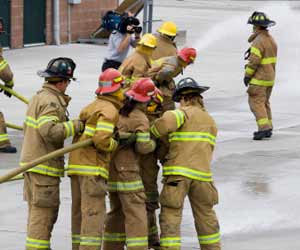Firefighter Career and Education – Interview with Tim Beattie
Tim Beattie is a Captain with the Sarasota County Fire Department. He is a trained paramedic who has worked as an instructor at the local Paramedic/EMT school. Mr. Beattie was a medic on the City of Saratoga Police Department’s SWAT team for 12 years on an on-call basis. Currently, he is the Program Director for Keiser University’s Fire Science program.
How long have you been a firefighter, and what do you find most rewarding about your work?

The first answer everyone would expect to hear to this question is how rewarding it is to help people. However, it runs much deeper than that because being in fire service is not just a career, it is a way of life. My career started when I was a teenager on a small volunteer firefighter department and I have been a firefighter for 30 years. My father had been on the department and worked his way up from firefighter to assistant chief. I have been committed to this profession not only because we help people in need but because it is also so satisfying to teach others how to do their job and to share some of my own experiences. There is no better feeling than to have a firefighter you taught say thank you, because you made a difference in their life. Firefighters are in the profession for life – it isn’t something that ends after retirement.
What are the different ranks that exist in the fire department?
Different departments have a variety of rank structure but the most common starts as a firefighter, then Lieutenant, Captain, Assistant Chief, and Chief.
What kind of specialized training does a firefighter need to complete to be promoted?
Every state has different requirements. The state of Florida has a Fire Officer I certification that has 7 different classes, but each department can have its own requirements from no additional training to a Bachelors degree. More departments across the United States are, at a minimum, requiring an Associate degree to be promoted to an officer. That is one reason we designed the Fire Science program at Keiser University to have the classes required for Fire Officer I. The program meets NFPA standards for Fire Officer I and II.
The Fire Science Program at Keiser University helps prepare firefighters for management roles in the fire service. What job titles would completing the program qualify them for?
After completing the Associate Degree program at Keiser University the Fire Fighter would be prepared for a position as a company officer, Fire Inspector, Arson Investigator, or Fire Chief.
The Fire Science Program at Keiser University is one that students complete online. What are the advantages of this type of learning for firefighters?
We have students from all over the world, which allows our students to interact and learn about different problems and tactics that may arise, but because of their physical location, they might never have had the opportunity to experience. An example would be a large airline crash, or a high-rise fire. Another advantage to online learning is that students can structure their schoolwork around work and family schedules. At Keiser University, students take one class at a time for one month. This allows the student to still have 4 classes a semester but they can concentrate all of their attention on one subject at a time.


 Teach English in Asia
Teach English in Asia  Cruise Ship Jobs
Cruise Ship Jobs  Alaska Fishing Industry Jobs
Alaska Fishing Industry Jobs  Sharing Economy / Gig Economy
Sharing Economy / Gig Economy